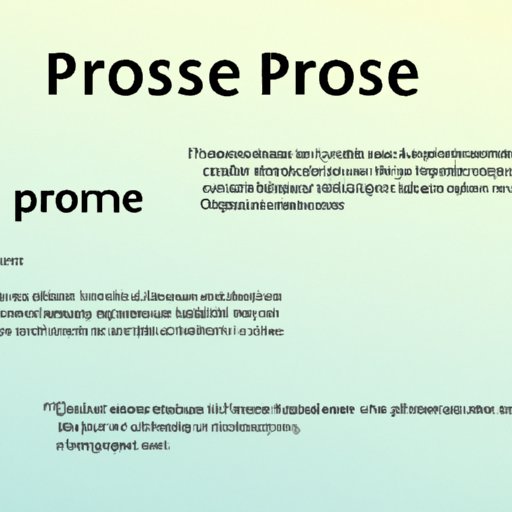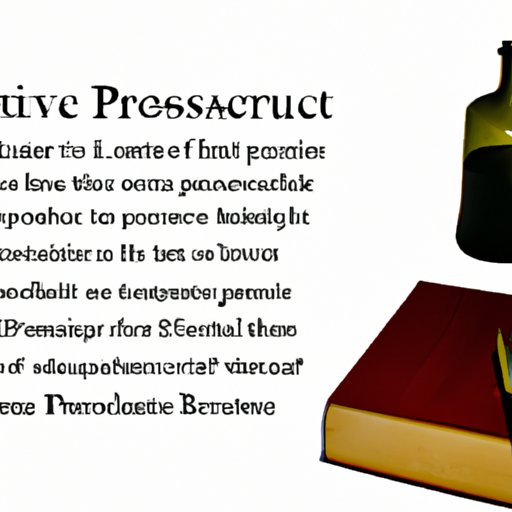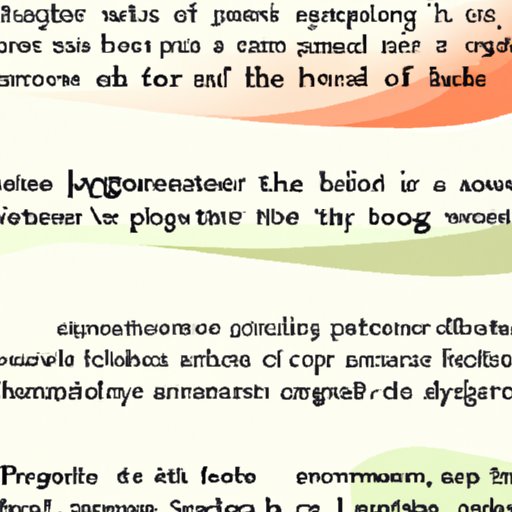
An Overview of Prose in Literature: A Definition and Examples
Prose is a form of language that has no formal metrical structure. It applies a natural flow of speech, and ordinary grammatical structure, rather than rhythmic structure, such as in the case of traditional poetry. Prose is most commonly found in novels, short stories, newspapers, magazines, encyclopedias, and other forms of writing. In literature, it is used to convey meaning, evoke emotions, and create an atmosphere or mood.
Definition of Prose
According to Merriam-Webster, “prose is the ordinary form of spoken or written language, without metrical structure.” This means that prose does not have any kind of set rhyme or rhythm, unlike poetry. It is the most common form of writing and can be found in books, articles, essays, short stories, and more.
Examples of Prose
Prose is everywhere in literature. Here are some examples of prose from famous authors:
“It was the best of times, it was the worst of times, it was the age of wisdom, it was the age of foolishness.” – Charles Dickens, A Tale of Two Cities
“I am an invisible man. No, I am not a spook like those who haunted Edgar Allan Poe; nor am I one of your Hollywood-movie ectoplasms. I am a man of substance, of flesh and bone, fiber and liquids – and I might even be said to possess a mind. I am invisible, understand, simply because people refuse to see me.” – Ralph Ellison, Invisible Man
“The sky above the port was the color of television, tuned to a dead channel.” – William Gibson, Neuromancer

Examining the Different Types of Prose in Literature
There are three main types of prose in literature: narrative prose, descriptive prose, and argumentative prose. Each type serves a different purpose and has its own unique characteristics.
Narrative Prose
Narrative prose is used to tell a story. It is often used in fiction, but can also be found in non-fiction. It is characterized by its use of plot, characters, setting, and dialogue. Narrative prose is meant to engage readers and draw them into the story.
Descriptive Prose
Descriptive prose is used to describe a scene, person, or event. It focuses on providing vivid details and creating an image in the reader’s mind. Descriptive prose is often used in poetry, but can also be found in novels and other forms of literature.
Argumentative Prose
Argumentative prose is used to make an argument or persuade readers to agree with a certain point of view. It is often used in essays and other forms of non-fiction. Argumentative prose is characterized by its use of facts, evidence, and logic to convince readers.
Exploring the Role of Prose in Literature
Prose plays an important role in literature. It is used to convey meaning, evoke emotion, and create an atmosphere or mood. It can also be used to develop characters and advance the plot.
Function of Prose in Literary Works
In literature, prose is used to convey the author’s message and create an emotional connection with the readers. According to a study conducted by the University of Oxford, “prose is more effective than poetry in conveying the author’s ideas and feelings.” The study found that prose was better at communicating complex ideas and eliciting an emotional response from readers.
Creating Moods, Atmospheres, and Characters
Prose is also used to create a mood or atmosphere in a work of literature. Authors can use descriptive prose to paint a vivid picture of a scene or setting, which can help readers visualize the world of the story and become more immersed in it. Prose can also be used to develop characters and create a sense of empathy between readers and the characters.

How to Write Effective Prose in Literature
Writing effective prose in literature requires skill and practice. Here are some tips for writing effective prose:
Developing a Strong Writing Style
Developing a strong writing style is essential for writing effective prose. To do this, authors must be familiar with the conventions of prose and learn to craft sentences that are clear, concise, and engaging. They should also strive to create a unique voice and style that reflects their personality and makes their writing stand out.
Crafting Clear and Engaging Sentences
Good prose is made up of clear and engaging sentences. Authors should pay attention to sentence structure and keep their sentences short and to the point. They should also avoid repetition and strive to find new ways of expressing the same idea.
Using Appropriate Figurative Language
Figurative language can be used to add depth and meaning to prose. Authors should use metaphors, similes, and other figures of speech sparingly and only when they are necessary. Overusing figurative language can make prose seem forced and detract from the overall effect.
Analyzing the Impact of Prose on Literary Works
Prose has a powerful impact on literary works. Here are some ways that prose affects the overall impact of a work of literature:
Understanding the Influence of Prose on Reader Response
Prose has a direct influence on reader response. By using descriptive prose, authors can create vivid images in readers’ minds and evoke strong emotions. This can help readers connect with the characters and become emotionally invested in the story.
Examining the Power of Prose in Character Development
Prose can be used to develop characters and create an emotional bond between readers and the characters. By crafting compelling dialogue and using descriptive prose, authors can give characters depth and make them more relatable.
Analyzing the Role of Prose in Establishing Tone and Theme
Prose can also be used to establish the tone and theme of a work of literature. By using specific words and phrases, authors can create a certain atmosphere or mood that reflects the overall tone and theme of the work.
Conclusion
Prose is an essential element of literature. It is used to convey meaning, evoke emotions, and create an atmosphere or mood. Through its use of plot, characters, setting, and dialogue, prose can be used to tell a story, describe a scene, or make an argument. It can also be used to develop characters and establish the tone and theme of a work of literature. By understanding the function and power of prose, authors can craft effective prose that will have a lasting impact on readers.
(Note: Is this article not meeting your expectations? Do you have knowledge or insights to share? Unlock new opportunities and expand your reach by joining our authors team. Click Registration to join us and share your expertise with our readers.)
